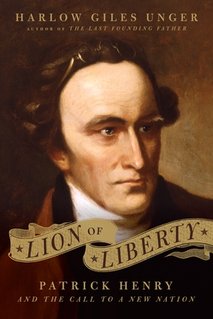
18 Nov 2010 03:41:20
Tea partiers think taxes are too high. In press materials for "Lion of Liberty: Patrick Henry and the Call to a New Nation," Unger cites Henry's failed effort to amend the Constitution so that any new federal tax would need a two-thirds vote in Congress and a greenlight from state legislatures.
Henry was also the father of 18 children. Friends "insisted that he, not Washington, was the real father of his country," Unger writes. "His direct descendants may number more than 100,000 today."
George Washington died childless.
With quotes from Henry's vivid oratory, Unger traces his rise in Virginia society before the Revolution. Though not quite a rags-to-riches tale — his folks were well-established lawyers and clergymen — "Lion of Liberty" tells entertainingly of how a homespun-clad upcountryman with an odd accent fitted into a British-trained, plantation-owning aristocracy of velvet jackets and white neckcloths.
Henry was fortunate that his speeches were so admired that many in his audiences, including family members, took ample notes that appear in the book as direct quotations. They add thrills to the text.
In one court plea, his climax coincided with thunder and lightning outside the courthouse, making spectators wonder if those were signs of heavenly approval. Some readers may be tempted to join in the wondering.
Combining talents as an informally trained lawyer and barkeeper, he scored a first legal victory over pastors of his own Anglican church. He called them "rapacious harpies" for claiming fees that local farmers resented. Since the church was part of the British royal government, his victory suffered cries of "Treason!" from opposing counsel.
During the Revolution, Henry stretched his powers as governor of Virginia to help Washington with shipments of blankets, warm clothes and money to promote re-enlistments of troops during the terrible winter at Valley Forge.
In what Unger writes "may have been one of the most significant and least known decisions of his life and, indeed, of the Revolutionary war," Henry revealed to Washington a plot to oust him from his command.
The friendship between Henry and Washington survived deep differences over postwar policy. Washington favored a strong federal government; Henry passionately defended rights of local authorities, especially over taxes. Washington nevertheless offered him posts such as secretary of state and chief justice of the Supreme Court. Henry declined.
"As this government stands, I despise and abhor it ..." Henry said during his effort to amend the Constitution. "If I am asked what is to be done when a people feel themselves intolerably oppressed, my answer is ... 'overturn the government.'"
Henry was also the father of 18 children. Friends "insisted that he, not Washington, was the real father of his country," Unger writes. "His direct descendants may number more than 100,000 today."
George Washington died childless.
With quotes from Henry's vivid oratory, Unger traces his rise in Virginia society before the Revolution. Though not quite a rags-to-riches tale — his folks were well-established lawyers and clergymen — "Lion of Liberty" tells entertainingly of how a homespun-clad upcountryman with an odd accent fitted into a British-trained, plantation-owning aristocracy of velvet jackets and white neckcloths.
Henry was fortunate that his speeches were so admired that many in his audiences, including family members, took ample notes that appear in the book as direct quotations. They add thrills to the text.
In one court plea, his climax coincided with thunder and lightning outside the courthouse, making spectators wonder if those were signs of heavenly approval. Some readers may be tempted to join in the wondering.
Combining talents as an informally trained lawyer and barkeeper, he scored a first legal victory over pastors of his own Anglican church. He called them "rapacious harpies" for claiming fees that local farmers resented. Since the church was part of the British royal government, his victory suffered cries of "Treason!" from opposing counsel.
During the Revolution, Henry stretched his powers as governor of Virginia to help Washington with shipments of blankets, warm clothes and money to promote re-enlistments of troops during the terrible winter at Valley Forge.
In what Unger writes "may have been one of the most significant and least known decisions of his life and, indeed, of the Revolutionary war," Henry revealed to Washington a plot to oust him from his command.
The friendship between Henry and Washington survived deep differences over postwar policy. Washington favored a strong federal government; Henry passionately defended rights of local authorities, especially over taxes. Washington nevertheless offered him posts such as secretary of state and chief justice of the Supreme Court. Henry declined.
"As this government stands, I despise and abhor it ..." Henry said during his effort to amend the Constitution. "If I am asked what is to be done when a people feel themselves intolerably oppressed, my answer is ... 'overturn the government.'"

